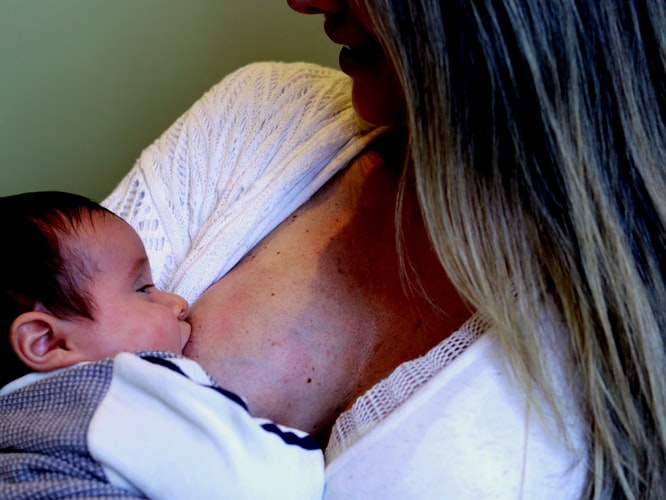Correct breastfeeding tips and advice are an important start to a new mother’s journey. Because of the nutritional benefits, it is important that mothers should breastfeed their newborn babies exclusively for a period of 6 months and then continue breastfeeding combined with solid food.
However, while it may be a natural process, breastfeeding does not always come easily. Cultural norms, work policies, lactation issues, latching problems and poor hospital policies are some of the factors that can affect the duration of breastfeeding. So, how should new mothers go about breastfeeding to ensure maximum value for their newborns? This article will provide some practical breastfeeding tips for new mothers.

Photo by Jordan Whitt via Unsplash
Benefits of Breastfeeding to the Baby
Breast milk contains healthy enzymes and immunity-boosting antibodies that benefit babies in a significant way. Some of the benefits of breastfeeding including the following;
• Reduced Risk of Viruses and Infections
Babies that are well breastfed have a lower risk of contracting viruses and infections, such as colds, pneumonia, and ear and respiratory infections.
• Lowered Stomach-related Issues
When done appropriately, breastfeeding helps lower the chances of stomach-related problems, including diarrhoea, indigestion, stomach upset and constipation.
• Prevents Obesity
Research shows that babies that are breastfed appropriately are less likely to suffer from obesity and overweight issues.
• Strengthened Immune System
Breast milk contains a wide range of elements that strengthen the baby’s immune system.
General Breastfeeding Tips for New Mothers

Photo by Jan Kopriva via Unsplash
• Breastfeed Immediately After Birth
This is one of the most important breastfeeding tips for new mums. Mothers are encouraged to have skin-to-skin contact with their newborns immediately after birth. This enhances the mother-child bond, regulating the child’s temperature and stimulating breast milk production. While the baby may not actively feed on the breast in their first feed, breastfeeding within the first hour of birth is highly recommended.
• Get Ready for Your Breastfeeding Sessions
The best way to ensure you are quickly acquainted with breastfeeding is by getting prepared for every session. This includes lying down or sitting comfortably, drinking a lot of fluids and using breast milk storage bags.
• Make Breastfeeding as Frequent as Possible
It is crucial to breastfeed your baby every time they show feeding cues (signs that the child needs breastfeeding). Such signs include lip licking, rooting, mouth opening, bringing hands and fingers to the mouth, or clenching fingers over the tummy.
• Let Your Baby Decide
The duration taken to breastfeed varies from one child to the other. While some may take a few minutes, other babies may demand over half an hour of breastfeeding. Babies are unique, and you might want to allow your child to decide how long and frequent to breastfeed.
• Be Patient with Your Breastfeeding
Breastfeeding can be stressful sometimes. You must exercise high levels of patience through the process. This may be through seeking support from an experienced mother or a breastfeeding specialist. Sometimes all you require is a few encouraging words and adjustment of your breastfeeding techniques.
• Take Your Time and Relax
Babies are quite sensitive to the emotional status of their mothers. They can tell when you are nervous or tensed, and this can adversely affect their latching. Before the baby gets its lips on your nipple, make sure you are emotionally stable and free from any tension. Take a deep breath and relieve yourself of any negative emotions or feelings.
• Take Care of Your Breast Skin
Your baby will be spending the better part of their first six months around your breast. Therefore, you want to ensure that your breast skin is well taken care of, cleaned and moisturised. Also, wear loose and comfortable clothing. Using skin-healing products may also come in handy when treating a chapped or dry breast skin.
• Eat Regularly
Breastfeeding burns out a lot of calories. As a result, there is always the chance that you will be getting hungry more often. Again, plenty of energy and nutrients are used in the process. It is essential to eat a balanced diet regularly.
Breastfeeding Tips for New Mums in the Hospital

Photo by Luiza Braun via Unsplash
Your first feed in the hospital might occur in the birthing room, delivery room or recovery area. Here are a few breastfeeding tips for new mothers while in the hospital.
• Do Not Hesitate to Get Help
If your instincts sense that something is wrong with your breastfeeding while in the hospital, do not hesitate to call out for help from nurses, experts, or your doctor.
• Nurse Within the First Hour of Delivery
Breastfeeding in the first hour of giving birth is crucial not only to stimulate milk production, but also for the child to get colostrum (first breast milk).
• Keep Off Formula Milk
Unless it is medically necessary, avoid feeding your newborn with formula milk during their first hours or even days. Newborns take time to break down formula milk, and this can result in unnecessary digestion issues.
If you cannot breastfeed but still want your child to enjoy the ‘goodness’ of breast milk, then pumping the milk is the best option. With a hospital grade breast pump, your nursing life as a new mother is made easier and safer. All you need to do is attach the pump to a breast, turn it on and leave it to serve its purpose.
Maintaining Milk Using a Breast Pump

While breast pumps are an essential requirement for new mothers, using one is not always easy. Here are a few breastfeeding tips for mothers using breast pumps.
• Follow the Guidelines
Following the right breast pump guidelines will help you benefit holistically from milk pumping. Such guidelines highlight how, when and how a breast pump should be used.
• Get the Right Fit
Breast pumps are built with flanges that vary in size. Your pump should not come with bigger or tight flanges. Otherwise, this may hinder you from pumping as much milk as you would want.
At O’Flynn Medical, we sell and rent Ameda Breast Pumps. Get in touch with us through the contact details on our website for more information.
Breastfeeding Tips for New Mothers at Work
You might have to resume your work while still nursing. Here are some breastfeeding tips for new mothers returning to work.
• Breastfeed your child before and after work.
• Use an electric breast pump to express and store adequate amounts of breast milk for your child.
• Do not go crazy about expressing milk for your child. Breastfeeding is also good for your health, which is why you must breastfeed your baby whenever you get an opportunity.
• Get support from friends, spouse, family members, or a caregiver. This will help you monitor how your baby is doing with the expressed milk in your absence.
Breastfeeding Tips during the Coronavirus Pandemic
The Coronavirus pandemic has left most mothers in fear of spreading the virus to their newborns through breast milk. However, as instructed by the World Health Organisation, mothers may still nurse their babies, with or without the virus. Here are some breastfeeding tips for mothers during the pandemic.
• Increase Your Milk Supply
Recent surveys indicate an increase in breastfeeding during lockdown, following the increased cases of Covid-19. Infected mothers must continue breastfeeding their children while exercising the recommended hygiene practices.
• Use Breast Pumps When Too Sick
If you become too ill to breastfeed naturally, you can express the milk and have an uninfected person help you in breastfeeding your baby.
• Be Careful with Formula Milk
For mothers who cannot breastfeed at all due to the effects of Coronavirus, formula milk can be used to nurse their babies. However, extra care should be taken with formula milk by following instructions highlighted on the packaging.
Final Thoughts
With these breastfeeding tips, new mothers can enjoy the benefits of nursing their babies for the first time. These tips include breastfeeding regularly, eating well, drinking fluids and using the right breast pumps. The breastfeeding tips apply to new mothers in hospitals, at work or at home.
FAQs
How long should a new mother breastfeed?
WHO recommends new mothers to breastfeed for six months exclusively. However, breastfeeding may continue for a period of up to 2 years.
How do first-time mums breastfeed?
First-time mums should breastfeed their babies naturally within their first hour of delivery.
How can I get better at breastfeeding?
Sit or lie in a comfortable posture, eat well, drink fluids regularly and consult breastfeeding experts for guidance.
What foods to avoid when breastfeeding?
Avoid caffeinated drinks, alcohol, some dairy products, and highly processed foods. Consult your doctor for guidance on food choices.

